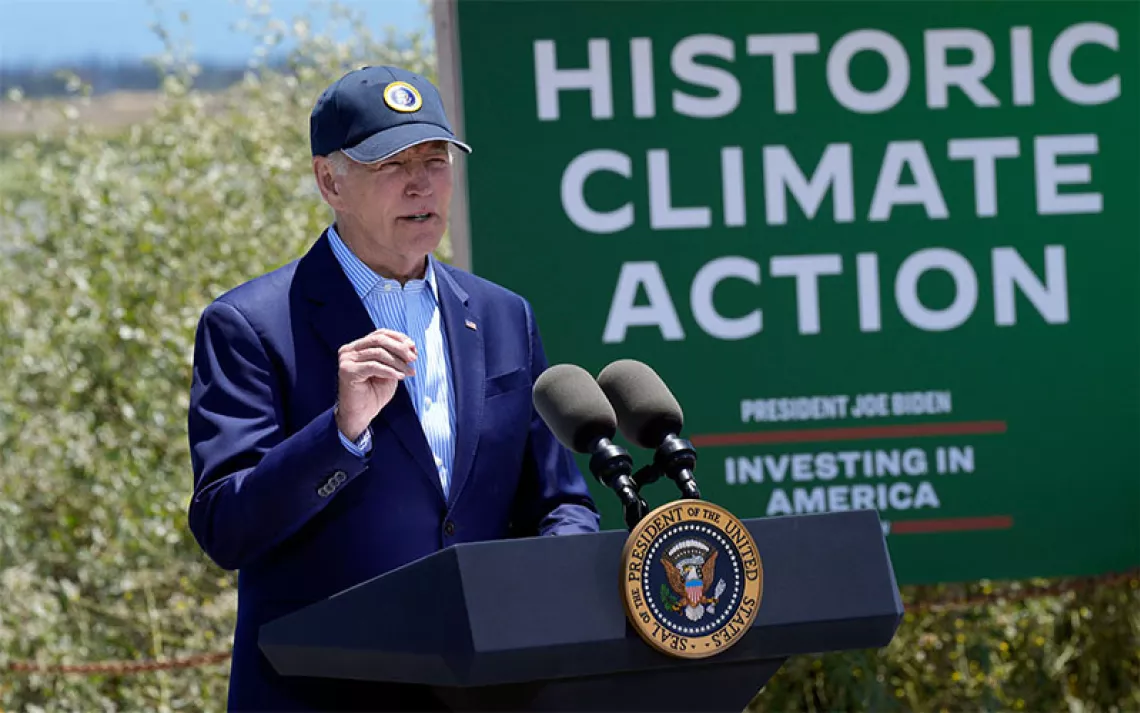Environmental Gains That Make us Thankful
It hasn’t been all bad news for the environment this year. Sierra lists 10 bright spots.

Photo by iStock/aga7ta
This Thanksgiving—perhaps more than ever—it’s important to pause and remind ourselves of recent environmental gains for which we can be grateful. Sierra has compiled a list of monumental global pacts, climate action champions, preserved natural wonders, and eco-victories that offer hope for a greener future.
1) The Paris Agreement’s enactment. Earlier this month, the international climate accord entered into force, with the intention of keeping global warming to no more than 2 degrees Celsius above preindustrial levels—the benchmark of when scientists say climate change will become disastrously irreversible. With or without President-elect Trump on board, this consensus from world leaders showcases an unprecedented international commitment to climate action.
2) A deal to phase out HFCs. In Kigali, Rwanda, representatives of nearly 200 nations approved a timeline to halt the usage of hydrofluorocarbons, commonly used in refrigerators and air conditioners. The elimination could reduce global warming by 0.5 degrees Celsius by 2100. "This day will unquestionably be remembered as one of the most important in our effort to save the one planet we have," the EPA said in a statement.
3) The indigenous fight against fossil fuels extraction. At the Standing Rock Indian Reservation, Sioux tribe members and their allies continue to fiercely oppose the 1,172-mile Dakota Access Pipeline. Ongoing protests have impeded its construction, which would move 470,000 barrels of crude oil daily, threatening Native sovereignty as well as the environment. The pipeline, set to cross the Missouri River, could pollute the community’s main water source and also destroy sacred sites along the way. “Our purpose is to protect the water,” Dave Archambault, chairman of the Standing Rock Sioux tribe, told NPR.
4) New national monuments. Over his tenure, President Barack Obama has designated 23 national monuments—more than any of his predecessors did. The 265 million acres of now protected land and water represent a wide range of landscapes and mementos from U.S. history. Using the Antiquities Act of 1906, Obama has preserved everything from waters off Hawaii’s coast to Harriet Tubman’s Underground Railroad.
5) The leadership of cities. Twenty cities nationwide have committed to 100 percent renewable energy, with the city council of St. Petersburg, Florida, adopting the goal earlier this week. Globally, dozens of major municipalities have heeded the international call to reduce carbon emissions via urban sustainability projects. Although a Trump presidency raises doubts about future federal climate initiatives, much of the decision-making when transitioning to renewables actually takes place at the state and local levels, notes Kassie Rohrbach, associate director of the Sierra Club’s Ready for 100 campaign. “[The election] further solidifies that cities need to be leaders in the process,” she said.
6) The defeat of Florida’s utility-backed solar ballot measure. Amendment 1, a misleading proposition that aimed to thwart the state’s rooftop solar industry, failed to get the 60 percent of votes required for passage. In true David vs. Goliath fashion, a scrappy grassroots coalition defeated Consumers for Smart Solar, a political action committee that spent over $21 million in advertisements and direct mail campaigns purporting to be pro solar. Critics dubbed the amendment a “wolf in sheep’s clothing.” The measure’s rejection marks a tremendous win for the state’s solar industry as well as its many allies.
7) Rain in California. This October brought surprisingly wet weather to a state ravaged by five years of severe drought. Northern California, home to many of the state’s vital reservoirs, experienced more than triple the month’s historic average precipitation—over 10 inches of rainfall. “We have no assurance it is going to be this good a month from now, but it’s a good start, and we have to rejoice,” Doug Carlson, a spokesman for the California Department of Water Resources in Sacramento, told the Mercury News.
8) King Coal’s shrinking reign. This year marked the retirement of 243 dirty power plants since 2010. That accounts for more than 80 percent of retired electricity generating capacity last year alone. Dropping demand for coal—alongside limited new plants in the works—signals a trend away from the dirty energy source, which heavily emits greenhouse gases and toxins with detrimental health impacts. Already, six states no longer house coal-burning power plants, except for combined heat and power facilities. With a number of other states like Alabama close behind, the phasing out of dirty coal is slated to continue throughout the coming decades.
9) A crackdown on wildlife trafficking. Last month, President Obama signed the Eliminate, Neutralize, and Disrupt (END) Wildlife Trafficking Act, which makes the offense a serious crime under U.S. law. The bipartisan bill passed unanimously through both the Senate and the House of Representatives, reflecting the devoted efforts of lawmakers and environmental groups over the past few years.
10) The national parks, especially in this centennial year. In 1916, President Woodrow Wilson signed into creation the National Park Service, with the sole purpose of protecting the dozens of national parks already established. Fast forward 100 years, and the United States is now home to 59 of these protected areas as well as hundreds of other national monuments, preserves, and historical parks. Shuffle through this Happy Birthday slideshow to admire the parks’ raw, untouched beauty—and the natural wonders we can always be grateful for.
 The Magazine of The Sierra Club
The Magazine of The Sierra Club



